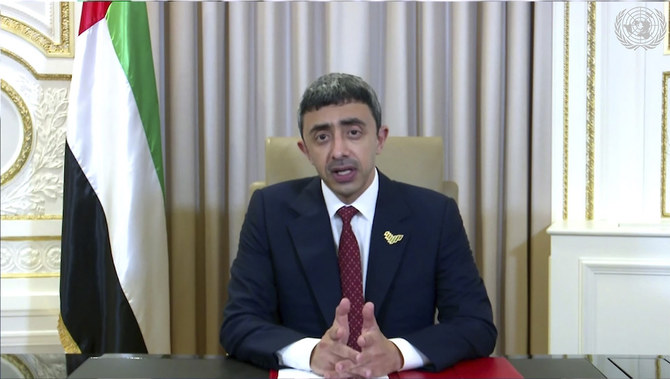LONDON: The signing of the Abraham Accord with Israel will increase prospects of a comprehensive peace in the Middle East, the UAE’s foreign minister said on Tuesday.
Sheikh Abdullah bin Zayed said the US-brokered agreement signed in Washington this month had frozen Israel’s annexation of the occupied West Bank.
“The call for the establishment of an independent Palestinian state on the borders of 1967 with East Jerusalem as its capital, in line with international resolutions and the Arab and international consensus will remain a firm demand,” Sheikh Abdullah told the UN General Assembly.
“My country has made persistent efforts using all available diplomatic channels to affirm our total rejection of the annexation of Palestinian territory and we have warned on its impact on all parties and on the security of the region,” he added.
The UAE and Bahrain became only the third and fourth Arab states to normalize relations with Israel when they signed the agreements at the White House.
Speaking in a prerecorded message, Sheikh Abdullah said the UAE hoped the accords would provide the opportunity for the Palestinians and the Israelis to “reengage in negotiations to achieve peace.”
“The UAE’s position toward supporting the Palestinian people and achieving the two-state solution is firm,” he said.
The signing of the historic #UAEIsrael #PeaceAccord, with American support, put a freeze on the annexation and opened broad prospects to achieve comprehensive peace in the region.
H.H. Sheikh Abdullah bin Zayed Al Nahyan explains why this is beneficial for all. pic.twitter.com/ShdetkB0WK
— UAE Mission to UN (@UAEMissionToUN) September 29, 2020
Speaking about opportunities with Israel from the deal, Sheikh Abdullah said the UAE would work to ensure the accord will open “new intellectual horizons in the region and create a prosperous path for future generations “who deserve a stable region and a better reality than wars and poverty.”
Sheikh Abdullah used his speech to reiterate that the UAE has a “legitimate right of sovereignty” over three Gulf islands, which are occupied by Iran.
Iran took control of Greater Tunb, Lesser Tunb, and Abu Musa, in 1971 “in flagrant violation of international law.”
He also called on Iran to stop developing ballistic missiles and arming terrorist groups.
The UAE, he said, is particularly concerned that restrictions imposed on Iran under its nuclear agreement with world powers are soon due to expire, “since the nuclear agreement did not achieve its desired outcome.”
Sheikh Abdullah hit out more broadly at countries interfering in Arab affairs.
“The flash points in Yemen, Syria, Libya, Iraq and others are linked to crude interventions in Arab affairs by countries to re-establish control and colonialism over the Arab region and the Horn of Africa, which caused bloody wars,” he said.
Along with Iran, Arab countries are increasingly concerned at Turkey’s role in the region after it ramped up military involvement in countries like Libya.
He said the UAE has deep concern over Turkey’s military interference in Libya, which is “an alarming part of regional interference in Arab affairs that exacerbated the humanitarian crisis, undermined efforts to reach a peaceful solution and destabilized the entire region.”
On Yemen, he said the UAE commends the efforts made by Saudi Arabia to restore peace oil the country and reiterates its support for the Riyadh Agreement, calling for a unified Yemeni position to reach a sustainable solution.
“We strongly believe that stability in Yemen can be restored, especially within the current environment that could lead to a complete cease-fire and a permanent political solution under the auspices of the UN.”
Sheikh Abdullah announced the UAE’s candidacy for a non-permanent seat in the Security Council for the period 2022-2023.
Meanwhile, Oman reaffirmed its support for the Palestinian people, the establishment of an independent Palestinian state, with East Jerusalem as its capital.
Oman's foreign minister Badr Albusaidi also called on Yemeni parties to join UN-backed dialogue to reach a peaceful solution to the conflict.
The Sultanate also called on the international community to support Lebanon's reconstruction efforts and help it grapple with the impact of the tragic explosion.

















